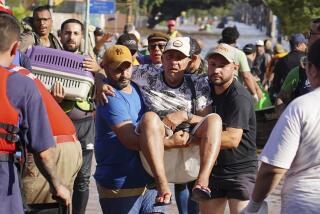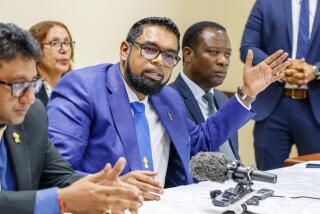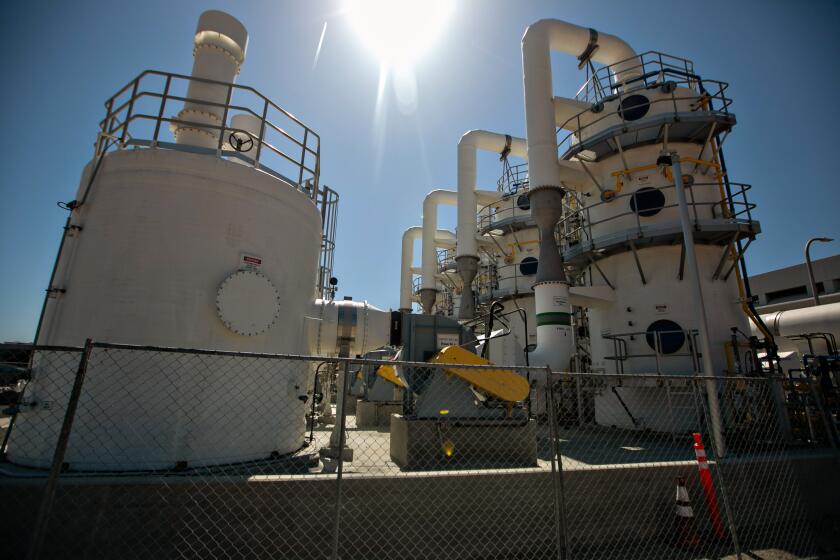Kurdish Rebels Hold City After Fierce Fighting : Iraq: Sulaymaniyah is peaceful, but a brigade force of 2,500 Iraqi soldiers patrols the outskirts.
Kurdish peshmerga guerrillas held this large city Sunday night, three days after intense fighting ended with up to 200 dead and 2,500 Iraqi soldiers prisoners of the peshmerga.
But a brigade force of 2,500 Iraqi soldiers patrolled the outskirts and surrounding area of Sulaymaniyah, a city of more than 900,000 in northeastern Iraq known as the birthplace of Kurdish nationalism.
Sulaymaniyah was peaceful Sunday night. People strolled through the center of the city, going in and out of shops. There were many visitors to the hospital where the wounded lay.
Scores, perhaps hundreds, died in fierce fighting Thursday in the city, scene of a Kurdish uprising in March. Sandbag defenses could be seen on many buildings, and peshmerga fighters carrying Kalashnikov rifles were everywhere.
Townspeople and the Iraqi government differed in their accounts of what happened here Thursday. Gov. Mohammed Najmudine Naqishbandi, a Kurd and former Iraqi army major general who represents President Saddam Hussein’s government in Sulaymaniyah, said the fighting was caused by infiltrators from Iran--at least some of them Iraqi.
According to Naqishbandi, who met with a group of international journalists here Sunday, the infiltrators, dressed in the uniforms of the peshmerga-- colorful robes and traditional Kurdish billowing trousers--incited violence by firing on Iraqi soldiers.
He put the number of dead at 100 to 150 in six hours of fighting but did not estimate the number of wounded, saying, “I have no clear knowledge.”
As to Iraqi prisoners captured by the peshmerga, he described them as soldiers who became “separated from their units” who now are returning.
Sulaymaniyah residents told a far different story. In four separate interviews by American journalists, they said 200 people were killed, most of them peshmerga, and that the Iraqis who had surrendered and become prisoners numbered 2,500.
The Sulaymaniyah residents said the fighting began after the Iraqi army killed two peshmerga guerrillas who had gone to an army post with a letter. At that, “all the people rose up,” said one man who identified himself as a veterinarian but declined to give his name. He pointed to a nearby shop that had been hit by a shell and said: “The army came into Sulaymaniyah with tanks. The people don’t want the army in Sulaymaniyah, they never want the army in Sulaymaniyah again.”
A stern-faced elderly man reported the same flash-point for the fighting: The army killed two peshmerga guerrillas in an encounter, and fierce fighting broke out, killing 200 in a matter of hours.
All the townspeople who were interviewed put the number of prisoners at 2,500, more than double the figure estimated by the International Red Cross in Geneva.
One man, a geologist who gave his name as Amanz, explained that many of the Iraqi soldiers who surrendered were Shiite Muslims from southern Iraq. “They had been promised they could get out of the army if they came up to the north,” he said. “When they were captured, many of them were crying, saying, ‘This is not our faith,’ ” he said.
The townspeople said the Red Cross had returned the prisoners to the Iraqi army. But the central government denied that the Red Cross is involved. “This is not an international prisoner of war issue,” said Gov. Naqishbandi.
(The Red Cross said about 20,000 Kurds fled from Sulaymaniyah toward the Iranian border during and after last week’s fighting, the Associated Press reported from Geneva.)
The government was at pains to play down Thursday’s incident in Sulaymaniyah and violence Wednesday in Irbil, the nearby capital of the Kurdish region, partly to avoid disruption of negotiations between the Kurds and Baghdad on local government for the Kurds, the 3.5 million non-Arab people who predominate in northern Iraq.
The Kurdish leadership has taken a similar approach toward the violence last week, describing it as an unfortunate incident.
And indeed the situation in Sulaymaniyah was curious Sunday night. Peshmerga guerrillas guarded the offices of the provincial governor. Yet Iraqi army officers and soldiers walked freely in and out among them.
On the road to Kirkuk, 65 miles to the west, guerrillas manned one roadblock, near the town of Chamchamal, while Iraqi soldiers were bivouacked in tents nearby.
The Kurdish people of Sulaymaniyah also said they support the autonomy negotiations with Hussein. “We want peace,” said Amanz, the geologist.
“We want freedom for the Kurdish people,” said another young man. “We want the U.S. and allied force to come again.”
The aftermath of the latest violence in Sulaymaniyah differs markedly from the events of March when a Kurdish uprising brought down the army’s wrath. Pockmarks of .50-caliber bullets from that fighting are visible in the whitewashed arch that leads to the center of the picturesque city, which sits at the base of low mountains, facing out to rolling, fertile plains.
Now, troops of the Iraqi army’s Mohammed Kassem brigade are keeping their distance on the outskirts of town, and allowing the peshmerga free rein within, while the Iraqi government praises the “coordination” between the sides.
Still, an indicator of the constant tensions here is that the road to Kirkuk, heavily patrolled by Iraqi soldiers by day, is closed when the army withdraws to barracks at night.
More to Read
Start your day right
Sign up for Essential California for news, features and recommendations from the L.A. Times and beyond in your inbox six days a week.
You may occasionally receive promotional content from the Los Angeles Times.






